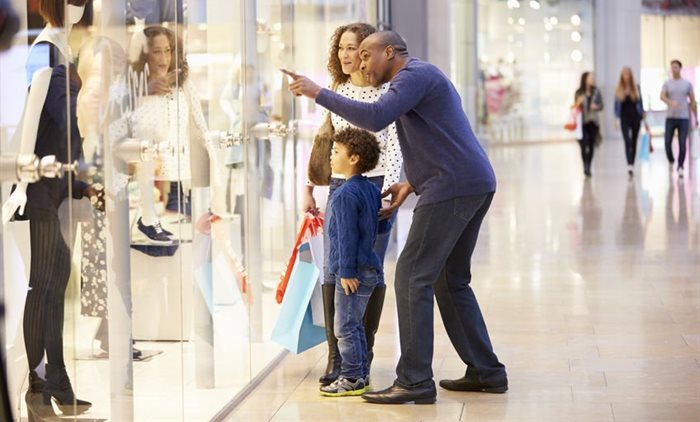
Source: ©Mark Bowden -
123RFSouth Africans have always been defined by their focus on community, society, socialising, and creating a sense of unity and togetherness – ubuntu. As a country that is more collective than individualistic according the five-factor model of McCrae and John (1992), which describes personality, South African consumers thrive in environments where there is a sense of family and community.
At the height of the Covid-19 pandemic, when social distancing restrictions first completely prohibited gatherings and then severely limited the number of people in them, many South African consumers missed the connectedness and togetherness they found in social gatherings such as weddings, funerals, sports events, workplace meetings, and Sunday lunches. One of the most popular recreational activities that consumers enjoyed doing with loved ones before the pandemic was visiting shopping malls.
South African consumers perceive shopping in malls to be recreational. This has created a ‘mall culture’ that has seen many consumers using visits to a shopping mall as a way to spend time with friends and family. Given the recreational perception of shopping malls, many malls include food courts, cinemas, and arcades.
During the pandemic, however, consumers could no longer visit shopping malls, which were perceived to offer more hedonic value, whereas shopping online was perceived as more utilitarian. Consumers lost their interest in and excitement about shopping, and missed the social, entertainment, and recreational fulfilment they got from shopping in malls.
Nqobile Dludla 30 Jun 2022 Two years on from 2020, the panic, fear, and worry associated with the pandemic has subsided as vaccines have been provided, the ‘national state of disaster’ has been lifted, and masks have been done away with. As a result, a kind of normality has returned, including increased foot traffic in shopping malls. This proves that the ‘mall culture’ is still alive in a somewhat post-pandemic world.
Retailers have thus dedicated more time and effort to improving consumers’ in-store shopping experience. Many retailers such as Pick n Pay, Mr Price, Massmart, and TFG have plans to revamp and expand the number of their existing stores in an attempt to increase foot traffic.
To integrate the spirit of ubuntu and maximise traffic in-store in the best way, retailers should consider doing the following:
1. Incentivise store visits
Because of South Africa’s mall culture, consumers perceive shopping as entertainment. Retailers can therefore use entertainment as a way to incentivise consumers to visit their store by creating a store environment that fosters creative, innovative, and entertaining activities such as pop-up events, runway shows, and events to promote new products.
One example is the DIY workstations at Leroy Merlin stores, where workshops educate consumers on how to do DIY and to use various power tools. Another is the Laher Holiday Camp, which hosts coding classes for children, teaching them to build and design apps using Apple’s coding language Swift.
2. Create experiential retail by stimulating all the senses
Creating a store environment that engages customers’ senses elevates the shopper’s journey and in-store experience, and could result in increased sales. Nowadays consumers are drawn to stores not only to purchase but also to have a store experience that creates something memorable that will have them coming back for more.
- Create a custom scent for the store; create a positive vibe through music
- Ensure that your lighting is pleasant and highlights the merchandise
- Offer free trials and samples
- Customise incentives for consumers such as personalised discounts, packages, and rewards programmes.
For example, the new Checkers upmarket stores and Checkers FreshX concept stores target more affluent consumers in direct competition with Woolworths. These Checkers stores offer a sit-down sushi bar, freshly-made artisanal bread, pastries, and cakes, downlights to create a more exclusive setting, upbeat music to create a positive mood among shoppers, and personalised rewards and promotions through the Xtra Savings rewards programme.
3. Integrate social media trends in-store
Since the Covid-19 pandemic and lockdown, consumers have turned to social media for entertainment. Thus social media usage has increased exponentially, with consumers actively using social media throughout the day.
When the retailer integrates various social media hashtags in-store, sets up a selfie wall, develops store-specific hashtags, gets consumers to participate in various hashtag challenges, and incentivises all of these strategies with a store discount or promotion, consumers are likely to visit the store.
Moreover, making references to pop culture tends to create more engagement, interest in, and liking of the retail brand. Examples include Checkers and the Tinder Swindler hype and Pick n Pay, which tapped into the Bridgerton fad.
4. Make retail stores community hubs
To appeal to the social aspect of mall culture, retailers in South Africa could transform their retail outlets into community hubs, so that the store is used for more than just buying and selling merchandise.
Instead, the store acts as a platform for retailers and consumers to engage with one another in a more interactive and collaborative way by hosting events, hosting new product launch functions, gathering feedback, and informing, educating, and coaching one another. For example, Decathlon – which specialises in sports merchandise – has opened a sports hub where “people can connect through a common love of sport, health and wellness”.
For retailers to appeal successfully to the needs of the South African consumer, they need to offer a sense of togetherness and of community, and try to create a shopping experience that is sociable and entertaining. This will guarantee success, interest, and preference as the country strives to build ubuntu.











































